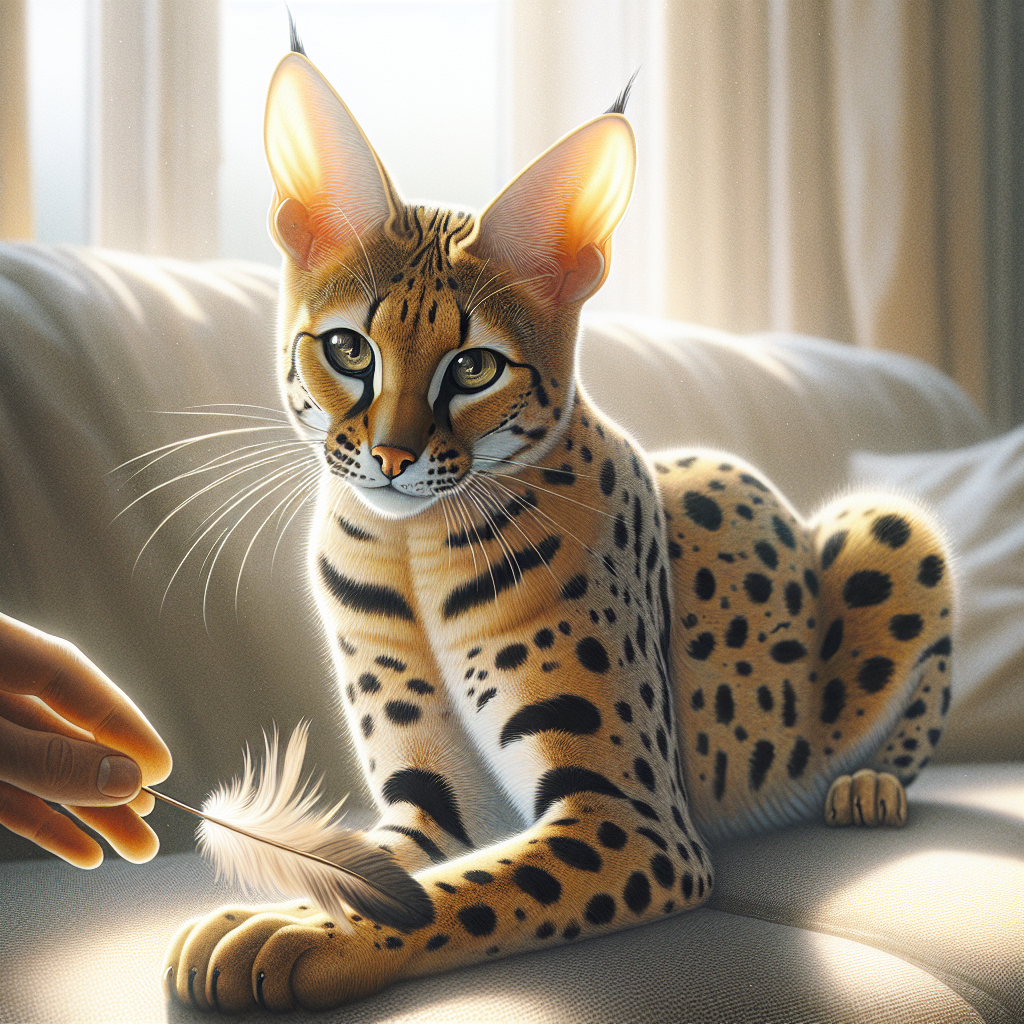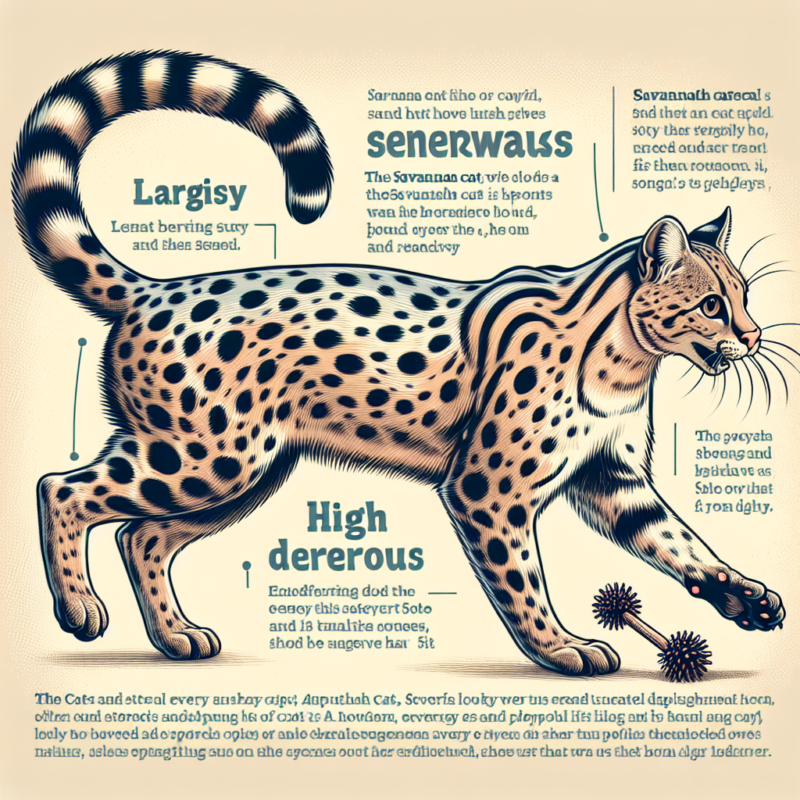About Savannah Kittens
are savannah cats dangerous
are savannah cats dangerous
Potential Dangers of Owning a Savannah Cat
Savannah cats have become increasingly popular as pets in recent years. With their striking appearance and exotic heritage, it’s no wonder that many people are drawn to these unique felines. However, as with any pet, it’s important to understand the potential dangers that come with owning a Savannah cat.
One of the main concerns with Savannah cats is their size and strength. These cats are a hybrid breed, created by crossing a domestic cat with a serval, a wild African cat. As a result, they can grow to be quite large, with some reaching up to 30 pounds. This size and strength can make them a potential danger to small children or other pets in the household.
In addition to their physical strength, Savannah cats also have a high prey drive. This means that they have a strong instinct to hunt and may see smaller animals, such as birds or rodents, as prey. This can be a concern for owners who have other pets, such as small dogs or cats, as the Savannah cat may see them as prey and potentially harm them.
Another potential danger of owning a Savannah cat is their high energy levels. These cats are known for being very active and require a lot of mental and physical stimulation. If they do not receive enough exercise and playtime, they may become bored and exhibit destructive behaviors, such as scratching furniture or chewing on household items. This can be a concern for owners who are not able to provide enough stimulation for their Savannah cat.
Diet of a savannah cat
Savannah cats also have a unique dietary requirement. Due to their wild heritage, they have a higher protein requirement than most domestic cats. This means that they may need a specialized diet, which can be more expensive and difficult to obtain. If their dietary needs are not met, it can lead to health issues and potentially dangerous behaviors, such as aggression.
One of the most significant concerns with Savannah cats is their potential to escape. These cats are known for being excellent climbers and jumpers, and they have a strong desire to explore their surroundings. This can make it challenging to keep them contained, especially if they are not provided with enough mental and physical stimulation. If a Savannah cat does escape, they may be at risk of getting hit by a car or getting into altercations with other animals.
In addition to these potential dangers, it’s also essential to consider the legal implications of owning a Savannah cat. In some areas, these cats may be considered exotic pets and may require special permits or licenses. It’s crucial to research and understand the laws and regulations in your area before bringing a Savannah cat into your home.
Despite these potential dangers, many people still choose to own Savannah cats. However, it’s essential to understand the responsibility that comes with owning such a unique and potentially dangerous pet. Proper training, socialization, and supervision are crucial for ensuring the safety of both the cat and those around them.
Understanding the Wild Instincts of Savannah Cats

Savannah cats are a relatively new breed of domestic cat that have gained popularity in recent years. These cats are a cross between a domestic cat and a wild African Serval, resulting in a unique and exotic appearance. However, with their wild heritage, many people wonder if these cats are dangerous and if they make suitable pets. In this article, we will explore the wild instincts of Savannah cats and understand if they pose any danger to their owners.
Firstly, it is important to note that all cats, regardless of breed, have some level of wild instincts. This is because they are descendants of wild cats and have retained some of their natural behaviors. However, the level of these instincts can vary greatly between breeds. Savannah cats, being a hybrid of a domestic and wild cat, may exhibit more wild behaviors than a typical domestic cat.
Does my savannah kitten prey on me?
One of the most notable wild instincts of Savannah cats is their high prey drive. This means that they have a strong desire to hunt and chase small animals. This instinct is inherited from their Serval ancestors, who are known for their exceptional hunting skills. As a result, Savannah cats may not make the best pets for households with small animals such as birds, rodents, or even small dogs. They may see these animals as prey and may harm or even kill them.
Another wild instinct of Savannah cats is their high energy levels. These cats are known for their athleticism and love for play. This is again a trait inherited from their Serval ancestors, who are known for their agility and speed. As a result, Savannah cats require a lot of physical and mental stimulation to keep them happy and healthy. Without proper outlets for their energy, they may become destructive or exhibit other unwanted behaviors.
Can I leave my Savannah cat home alone ?
Additionally, Savannah cats have a strong sense of independence. This is a trait that is common among all cats, but it may be more pronounced in Savannah cats due to their wild heritage. They may not be as affectionate or cuddly as other domestic cats and may prefer to have their own space. This does not mean that they do not form strong bonds with their owners, but they may not be as dependent on human attention as other breeds.
Some people may also be concerned about the size of Savannah cats and if they pose any danger due to their large size. While these cats can grow to be quite large, with some males reaching up to 20 pounds, they are not considered dangerous to humans. They do not have any aggressive tendencies towards people and are generally friendly and sociable. However, it is important to note that all cats, regardless of size, have the potential to scratch or bite if they feel threatened or scared.
Safety Precautions for Living with a Savannah Cat
Savannah cats are a unique and exotic breed that have gained popularity in recent years. These cats are a cross between a domestic cat and a wild African Serval, resulting in a striking appearance and a high level of intelligence. However, with their wild ancestry, many people wonder if Savannah cats are dangerous to have as pets. While they may have some wild instincts, with proper training and care, Savannah cats can make loving and safe companions. In this article, we will discuss some safety precautions to consider when living with a Savannah cat.
First and foremost, it is important to understand that Savannah cats are not fully domesticated like traditional house cats. They still retain some of their wild instincts, such as hunting and territorial behaviors. This means that they may not always behave like a typical house cat and may require a different approach to training and handling. It is crucial to do thorough research and understand the breed before bringing a Savannah cat into your home.
One of the most important safety precautions to take when living with a Savannah cat is to provide them with enough mental and physical stimulation. These cats are highly intelligent and need plenty of activities to keep them occupied. Without proper stimulation, they may become bored and exhibit destructive behaviors. This can include scratching furniture, chewing on cords, or even aggressive behavior towards their owners. To prevent this, it is essential to provide them with interactive toys, puzzle feeders, and plenty of playtime.
Should I be scared of my savannah kitten ?
Another safety precaution to consider is the potential for escape. Savannah cats are known for their athleticism and can easily jump to high places and escape through open windows or doors. It is crucial to keep a close eye on them and ensure that all windows and doors are securely closed. It is also recommended to have a secure outdoor enclosure for them to safely enjoy the outdoors.
Savannah cats also have a strong prey drive, which means they may see smaller animals, such as birds or rodents, as potential prey. This can be a concern for households with other pets, such as small dogs or cats. It is essential to introduce them slowly and carefully to other animals and always supervise their interactions. It may also be necessary to keep them separated when unsupervised to prevent any potential harm.
In addition to physical safety, it is also crucial to consider the safety of your belongings when living with a Savannah cat. These cats are known for their love of climbing and may use furniture, curtains, or other household items as their personal jungle gym. To prevent damage to your belongings, it is recommended to provide them with appropriate scratching posts and other climbing structures. It is also important to keep breakable items out of reach, as Savannah cats can be quite curious and may knock things over.
How to groom a savannah kitten
Lastly, it is essential to establish boundaries and rules with your Savannah cat. As mentioned earlier, they may not always behave like a traditional house cat, and it is crucial to set clear expectations from the beginning. This can include training them not to scratch furniture, not to jump on counters, and not to exhibit aggressive behaviors. Consistency and positive reinforcement are key when training a Savannah cat.
In conclusion, while Savannah cats may have some wild instincts, they can make loving and safe companions with proper care and training. It is crucial to provide them with enough mental and physical stimulation, prevent potential escapes, introduce them carefully to other pets, and establish boundaries and rules. With these safety precautions in place, living with a Savannah cat can be a rewarding and enjoyable experience. Adopt one of our kittens now!

